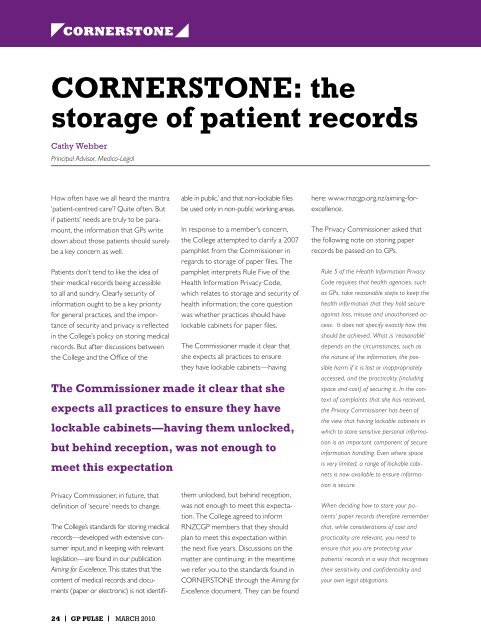GP Pulse 03.2010 - The Royal New Zealand College of General ...
GP Pulse 03.2010 - The Royal New Zealand College of General ...
GP Pulse 03.2010 - The Royal New Zealand College of General ...
You also want an ePaper? Increase the reach of your titles
YUMPU automatically turns print PDFs into web optimized ePapers that Google loves.
cornerstone<br />
CORNERSTONE: the<br />
storage <strong>of</strong> patient records<br />
Cathy Webber<br />
Principal Advisor, Medico-Legal<br />
How <strong>of</strong>ten have we all heard the mantra<br />
‘patient-centred care’? Quite <strong>of</strong>ten. But<br />
if patients’ needs are truly to be paramount,<br />
the information that <strong>GP</strong>s write<br />
down about those patients should surely<br />
be a key concern as well.<br />
Patients don’t tend to like the idea <strong>of</strong><br />
their medical records being accessible<br />
to all and sundry. Clearly security <strong>of</strong><br />
information ought to be a key priority<br />
for general practices, and the importance<br />
<strong>of</strong> security and privacy is reflected<br />
in the <strong>College</strong>’s policy on storing medical<br />
records. But after discussions between<br />
the <strong>College</strong> and the Office <strong>of</strong> the<br />
able in public,’ and that non-lockable files<br />
be used only in non-public working areas.<br />
In response to a member’s concern,<br />
the <strong>College</strong> attempted to clarify a 2007<br />
pamphlet from the Commissioner in<br />
regards to storage <strong>of</strong> paper files. <strong>The</strong><br />
pamphlet interprets Rule Five <strong>of</strong> the<br />
Health Information Privacy Code,<br />
which relates to storage and security <strong>of</strong><br />
health information; the core question<br />
was whether practices should have<br />
lockable cabinets for paper files.<br />
<strong>The</strong> Commissioner made it clear that<br />
she expects all practices to ensure<br />
they have lockable cabinets—having<br />
<strong>The</strong> Commissioner made it clear that she<br />
expects all practices to ensure they have<br />
lockable cabinets—having them unlocked,<br />
but behind reception, was not enough to<br />
meet this expectation<br />
Privacy Commissioner, in future, that<br />
definition <strong>of</strong> ‘secure’ needs to change.<br />
<strong>The</strong> <strong>College</strong>’s standards for storing medical<br />
records—developed with extensive consumer<br />
input, and in keeping with relevant<br />
legislation—are found in our publication<br />
Aiming for Excellence. This states that ‘the<br />
content <strong>of</strong> medical records and documents<br />
(paper or electronic) is not identifithem<br />
unlocked, but behind reception,<br />
was not enough to meet this expectation.<br />
<strong>The</strong> <strong>College</strong> agreed to inform<br />
RNZC<strong>GP</strong> members that they should<br />
plan to meet this expectation within<br />
the next five years. Discussions on the<br />
matter are continuing: in the meantime<br />
we refer you to the standards found in<br />
CORNERSTONE through the Aiming for<br />
Excellence document. <strong>The</strong>y can be found<br />
here: www.rnzcgp.org.nz/aiming-forexcellence.<br />
<strong>The</strong> Privacy Commissioner asked that<br />
the following note on storing paper<br />
records be passed on to <strong>GP</strong>s.<br />
Rule 5 <strong>of</strong> the Health Information Privacy<br />
Code requires that health agencies, such<br />
as <strong>GP</strong>s, take reasonable steps to keep the<br />
health information that they hold secure<br />
against loss, misuse and unauthorised access.<br />
It does not specify exactly how this<br />
should be achieved. What is ‘reasonable’<br />
depends on the circumstances, such as<br />
the nature <strong>of</strong> the information, the possible<br />
harm if it is lost or inappropriately<br />
accessed, and the practicality (including<br />
space and cost) <strong>of</strong> securing it. In the context<br />
<strong>of</strong> complaints that she has received,<br />
the Privacy Commissioner has been <strong>of</strong><br />
the view that having lockable cabinets in<br />
which to store sensitive personal information<br />
is an important component <strong>of</strong> secure<br />
information handling. Even where space<br />
is very limited, a range <strong>of</strong> lockable cabinets<br />
is now available to ensure information<br />
is secure.<br />
When deciding how to store your patients’<br />
paper records therefore remember<br />
that, while considerations <strong>of</strong> cost and<br />
practicality are relevant, you need to<br />
ensure that you are protecting your<br />
patients’ records in a way that recognises<br />
their sensitivity and confidentiality and<br />
your own legal obligations.<br />
24 | <strong>GP</strong> PULSE | MARCH 2010

















